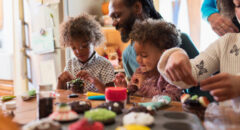What Is Conscious Parenting?
In a nutshell, Conscious Parenting is a research and science-backed parenting style that focuses on the parent-child relationship as well as the child’s development. It is often referred to as Gentle Parenting, however, I’ve always felt that label doesn’t quite fit as it doesn’t lean heavily enough on the idea of consciousness. You cannot be gentle if you are not conscious.
In practice, Conscious Parenting is everything opposite from the way in which most of us were raised. No spanking. No yelling. No shaming. No threats. No Punishments. Kindness above all else, no matter what the child does. If you’ve not heard of this style of parenting before, everything I’ve just written sounds like madness. But I can assure you, I’ve not gone mad. On the contrary, I’ve never felt more sane and on top of my parenting since I embarked on my Conscious Parenting journey two years ago.
The Controversy
Much of the pushback Conscious Parents receive is because we live in a society of rules, and we’ve been conditioned to believe that the only way we can ensure that we raise children who follow the rules is by being tough. Anything else is seen as permissive and a recipe for raising juvenile delinquents. Critics often say, “The world isn’t full of rainbows and sunshine, our kids need to be prepared for the real world.” “Spare the rod spoil child,” is another one that gets thrown my way at least once a week. There is also this bizarre belief that compassion, kindness, and understanding is the reason why there are so many angry, violent, and disrespectful young people. All of these beliefs, of course, are rooted in fear. We fear what we do not know or understand.
As a mother to two black sons, I am keenly aware of the world we live in, but I’m also recipient of tough parenting and it did not prepare me for the world. In fact, I live with chronic anxiety and a host of other challenges stemming from traditional parenting. I’ll share more of my story in subsequent posts, but if you’d like to learn even more about Conscious Parenting grab my ebook, No Right Way, here.

In her book, The Conscious Parent, Dr. Shefali Tsabary, encourages intentionality on the part of parents. Instead of reacting to our children from our egos, parents are urged to use patience, understanding, and awareness. We must model the behavior we’d like to see in our children, while also understanding where they are in their development. Much of what we expect of our children doesn’t actually line up with how their brains work at a particular age.
For instance, parents often ask me, “How do I get my toddler to stop hitting?” Or “How do I get my toddler to stop throwing tantrums?” Both of those actions, while unpleasant, are developmentally appropriate. Our job, as parents is to guide them and show them how they should behave when they are displeased. Instead, parents often become enraged and take this behavior personally, especially if the child exhibits this behavior in the presence of others. Meanwhile, the child is doing what they are supposed to be doing. Now, I’m not suggesting that we do nothing, but what we have to know is child development. We have to understand what to expect from our children according to science, not according to what we “think.” This is what it means to be conscious: to stop, think, then react.
Children serve as mirrors of their parents’ forgotten self. Those willing to look in the mirror have an opportunity to establish a relationship with their own inner state of wholeness. Once they find their way back to their essence, parents enter into communion with their children, shifting away from the traditional parent-to-child “know it all” approach and more towards a mutual parent-with-child relationship.”
Dr. Shefali, The Conscious Parent.

Some Of The Key Tenets Of Conscious Parenting Include:
Seeing Our Children As Equals
Traditional Parenting espouses the “I am the boss” mentality. Children are seen as less than their parents and therefore undeserving of the very respect they expect to receive from their children. In Conscious parenting, we do not view children as less than us. While we, of course, are the authority in the household, we don’t flex that for the sake of flexing it. Ego is thrown out the window, and replaced with compassion, understanding, and guidance.
RELATED: Gentle Parenting Is Becoming The Go-To Parenting Style, But Is It Best?
Allowing Our Children To Have A Voice, And Respecting Their Autonomy
All feelings are valid, and all behavior is communication. In Conscious Parenting, we understand that we cannot tell a child what they should or should not feel. On the contrary, we allow our children to express themselves without shame or guilt.
No Punishment
Research tells us that punishment is an ineffective means to curb undesirable behavior. Oftentimes our children aren’t being intentionally disobedient. They aren’t being manipulative. They aren’t plotting our demise. They are children. They don’t really understand much of anything, to be frank. We have to teach them, not punish them. In Conscious Parenting, we allow for logical and natural consequences. Don’t worry, I’ll have more on that in subsequent posts.
No Hitting/Spanking/Yelling
Do I even need to explain? If you’re curious read the Harvard study about the effects of spanking on the brain here.
Healing Your Own Traumas
Much of what we do as parents, even the stuff we didn’t like as children, is learned behavior. We repeat it because we often think, “I turned out fine.” In truth, many of us have an inaccurate understanding of trauma, and therefore have a hard time acknowledging that our parents decisions, did, in fact, have lasting impact on the way we behave. You do not have to be rocking in the corner wearing a straight jacket to be someone living with trauma. In Conscious Parenting, we must be willing to unpack and heal our traumas, otherwise, we will be bound to repeat and reinforce generational curses.
Accountability
Obviously, we’re human beings so falling short will come with the territory. The key to “getting this right” is to not expect to “get it right,” but to simply try to do a better job than our parents did. And when we mess up, we hold ourselves accountable and apologize.
If you’ve read this far, I encourage you to read The Book You Wish Your Parents Had Read to understand more about why we parent this way and why you should join the Conscious Parenting Movement.

This article was originally published on Consciously Lisa









